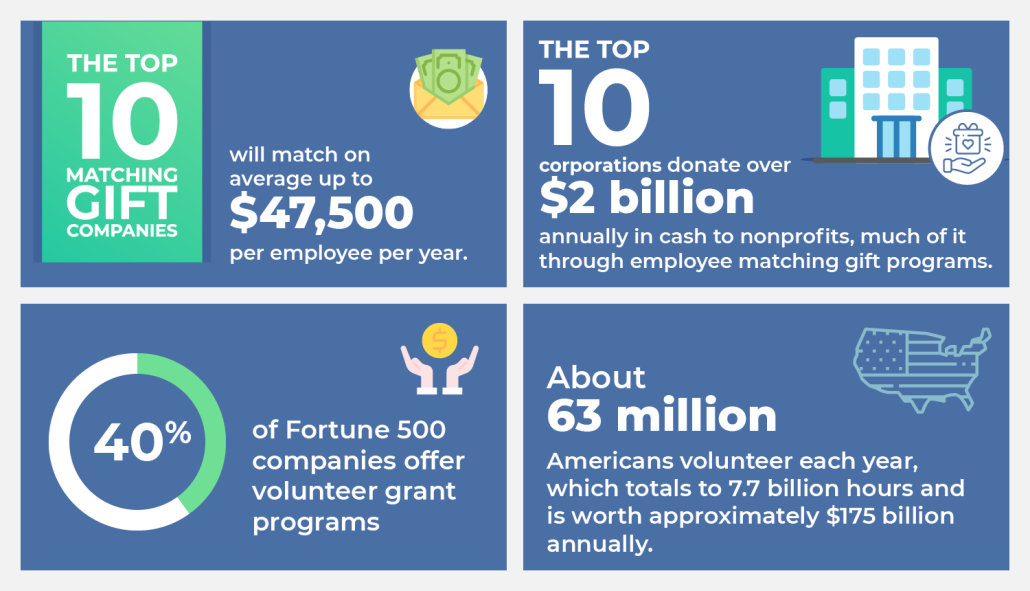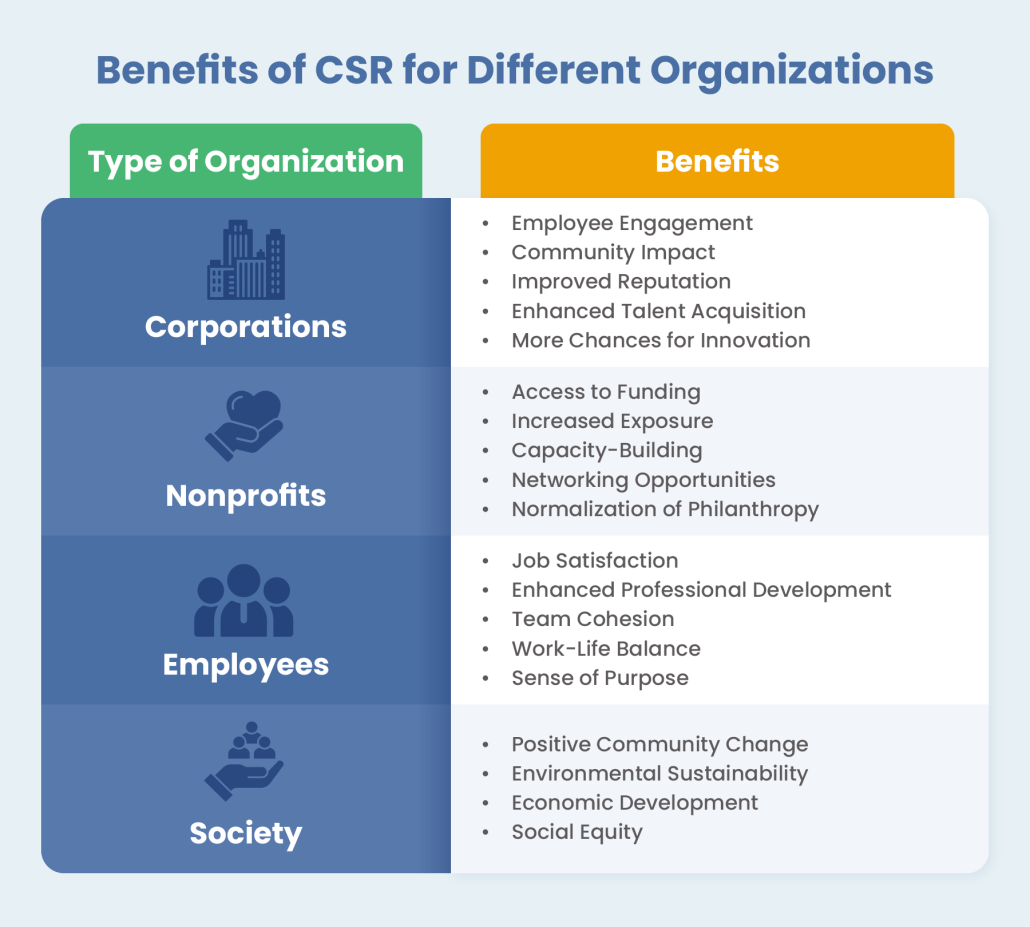CSR: What to Know About Corporate Social Responsibility
If you’re a nonprofit professional trying to determine how corporate social responsibility applies to your organization, you’re in the right place! Corporate social responsibility (also known as CSR) can have a huge impact on not only your organization’s revenue but also your relationships with individuals and companies alike.
In this guide, we’ll outline what corporate social responsibility is, as well as how CSR efforts directly impact nonprofits like yours. Read along with us from the top or use the below navigation to find the sections that most interest you:
- Corporate Social Responsibility FAQs
- Types of Corporate Social Responsibility to Know
- Leading Examples of Corporate Social Responsibility
- Ways Your Nonprofit Should Engage with CSR Departments
- How Double the Donation Matching Drive CSR
Let’s get started!
Corporate Social Responsibility FAQ
What is corporate social responsibility?
Corporate social responsibility (or CSR) refers to a company’s attitude and efforts toward improving society. CSR helps companies be socially accountable through a variety of avenues, including philanthropic practices, economic factors, and environmental awareness.
CSR can look vastly different for different businesses, too. For example, let’s examine some hypothetical applications of a socially responsible mindset in a corporate setting:
- Pledging to reduce energy consumption by installing eco-friendly lights in the office
- Empowering employees to make a bigger impact on causes they care about by matching their charitable contributions
- Sponsoring nonprofits or hosting charity events on behalf of a nonprofit
- Supplying paid time off work for employees to partake in skills-based or other corporate volunteer opportunities
- Investing in employee wellness and equity programs
What do all of these ideas have in common? The company is making plans to go above and beyond to benefit society—and people, as a whole—over its bottom line.
These are just a few ideas that companies can integrate into their own practices, and we’ll go over more opportunities later.
Why is CSR or corporate social responsibility important for nonprofits?
CSR is important because it impacts more than just companies. It impacts employees of those companies, nonprofits, and the greater community.
According to Double the Donation’s recent statistics:

- The top 10 matching gift companies will match, on average, up to $47,500 per employee per year.
- The top 10 corporations donate over $2 billion annually in cash to nonprofits, much of it through employee matching gift programs.
- 40% of Fortune 500 companies offer volunteer grant programs.
- About 63 million Americans volunteer each year, which totals 7.7 billion hours and is worth approximately $175 billion annually.
What are the advantages of corporate social responsibility?
CSR comes with many benefits. Businesses can give back to the community and build a positive image around their company brand, and nonprofits can continue working toward their missions with extra support from these companies. Here are some benefits broken up by type of organization:

Benefits of CSR for corporations:
- Employee engagement. Employees enjoy working for companies that take part in CSR because of the positive public image that results. When an employee’s company is constantly in the media for good reasons, they will be more engaged in their roles and proud of their company’s CSR. Employees also feel valued when companies support the organizations they care about.
- Community impact. Society as a whole can also benefit from CSR. Companies that are mindful of the impact they can make socially, environmentally, and economically will be able to help improve society.
- Improved reputation. When companies take part in CSR, consumers are more likely to want to work with them or purchase their products or services. Companies that offer this kind of positive social value will be more successful and form stronger relationships within their communities.
- Enhanced talent acquisition. Not only does CSR impact existing employees, but it can also help companies recruit talented new team members. For instance, a company that’s lauded for its DEI initiatives will likely attract a more inventive crop of potential hires who can improve the company with their own diverse experiences.
- More chances for innovation. When corporations embrace CSR, they often need to overhaul how they’re currently operating and come up with new ideas. Encouraging team members to be part of the change by suggesting improvements can help spark creativity, efficiency, and proactivity in the workplace. Not to mention, this signals to employees that their voices are valued.
Benefits of CSR for nonprofits:
- Access to mission-critical funds. Nonprofits are consistently working toward a mission that targets the greater good. When CSR programs provide them with grants, matching gifts, and other forms of support beyond individual donors, nonprofits have more resources to perform important tasks.
- Increased exposure. Partnering with a corporation is a great marketing opportunity for nonprofits to reach the company’s customers and other stakeholders. Plus, nonprofits will experience the benefits of social proof when the corporation’s customers see that they’re supporting a cause and feel inclined to support it too.
- Capacity-building. Corporations can provide much more than funds to support nonprofits. They can also provide time and resources to help expand the nonprofit partner’s bandwidth, such as pro-bono services or event venues.
- Expanded networking opportunities. As part of a partnership with a corporation, nonprofits can access more chances to build relationships in the corporate space and the community at large, which can lead to funding opportunities in the future.
- Normalization of philanthropy. Many people want to help the world, but they might not know how or where to start. Corporate giving partnerships with nonprofits provide an easy way for workers to make an impact through a familiar organization: their employer.
Benefits of CSR for employees:
- Increased job satisfaction. Employees working for socially responsible companies tend to experience higher job satisfaction. Knowing that their employer is committed to making a positive impact on society can enhance their sense of purpose and pride in their work. This, in turn, leads to greater loyalty and a more motivated workforce.
- Enhanced professional development. CSR initiatives often provide employees with opportunities to develop new skills and gain experiences outside their regular job responsibilities. For example, volunteering programs or sustainability projects can help employees build leadership, project management, and teamwork skills. This not only benefits the employees but also adds value to the company.
- Stronger team cohesion. Engaging in CSR activities can bring employees together, fostering a sense of camaraderie and teamwork. When employees collaborate on initiatives that align with their values, it can strengthen relationships and create a more cohesive and supportive work environment. This unity can translate into higher productivity and better overall performance.
- Improved work-life balance. Companies that prioritize CSR often implement policies that support work-life balance, such as flexible working hours, remote work options, or wellness programs. These initiatives show that the company values the well-being of its employees, which can reduce stress and burnout, leading to a healthier and more satisfied workforce.
- Increased sense of purpose. Working for a company that prioritizes CSR gives employees a sense of purpose beyond their daily tasks. Knowing that their work contributes to positive social and environmental outcomes can make their roles feel more meaningful. This increased sense of purpose can lead to higher levels of engagement and fulfillment in their careers.
Benefits of CSR for society:
- Positive societal change. Corporate Social Responsibility (CSR) initiatives can lead to significant positive changes in society. Companies that prioritize CSR can address critical social issues, such as poverty, education, and healthcare, creating a ripple effect that benefits communities and society as a whole. This commitment to the greater good can help alleviate systemic problems and contribute to a more equitable and just world.
- Environmental sustainability. By adopting CSR practices, companies can play a pivotal role in promoting environmental sustainability. This might involve reducing carbon footprints, minimizing waste, or investing in renewable energy. These efforts not only protect the environment but also set a standard for other organizations and individuals to follow, leading to broader ecological preservation and a healthier planet for future generations.
- Economic development. CSR can also spur economic development by creating jobs, supporting local businesses, and fostering innovation. When companies invest in the communities where they operate, they help stimulate economic growth, which can reduce unemployment rates and improve the quality of life for residents. This kind of responsible business practice can lead to more stable and prosperous societies.
- Social inclusion and equity. Companies engaged in CSR often focus on promoting social inclusion and equity by supporting initiatives that address discrimination and inequality. Whether through diversity, equity, and inclusion (DEI) programs or partnerships with marginalized communities, these efforts can help to break down barriers and create a more inclusive society where everyone has the opportunity to thrive.
Types of Corporate Social Responsibility to Know
Philanthropic
A large part of CSR consists of corporate philanthropy. Corporate philanthropy is the act of a company promoting the welfare of others, usually through charitable donations of funds. This type of CSR serves humanity by donating time, money, or resources to different nonprofits with varying causes, such as human rights, disaster relief, and educational programs.
Here are a few examples of philanthropic responsibility:
Example #1: Matching Gifts
Matching gifts are one of the most common CSR programs for companies. Essentially, companies will match the donations their employees make to nonprofit organizations at a specific ratio, usually 1:1 (though many companies match at a higher ratio, such as 2:1 or even 3:1!).
This CSR program can have a huge impact. For example:
- 65% of Fortune 500 companies offer matching gift programs.
- Over 18 million individuals work for companies with matching gift programs.
- 12% of total corporate cash contributions to nonprofits are made through matching gift programs. Corporations donated a total of $23.8 billion to nonprofits in 2018.
How to raise more with this CSR strategy: Your organization can raise more through CSR by leveraging a matching gift database, such as Double the Donation Matching. This database automates much of the process surrounding matching gift submissions, reducing the effort needed from your team. The more awareness there is surrounding matching gifts, the more nonprofits can receive from CSR companies.
Example #2: Sponsorships
Corporate sponsorships are an additional way for corporations to support nonprofits, both for fundraising and awareness purposes. Corporations team up with like-minded nonprofits to provide support for their mission, whether it’s providing computers for the nonprofit’s office, launching a matching donation challenge, or simply donating to the cause.
Sponsorships are mutually beneficial for both nonprofits and corporations. According to Double the Donation, these are the biggest corporate sponsors:
- Wells Fargo comes out on top, sponsoring nearly 3% of the nonprofits surveyed
- State Farm is in second place, sponsoring 1.07% of the nonprofits surveyed
- PepsiCo is in third place, sponsoring .98% of nonprofits surveyed
How to raise more with this CSR strategy: Nonprofits can leverage more sponsorships by using a reputable database of different companies’ CSR practices. Double the Donation’s comprehensive list of companies that give to nonprofits is a great place to start. Also, cover all of your bases by reaching out to local businesses for smaller sponsorship opportunities.
For example: Visa will match a maximum of $5,000 per employee at a 1:1 ratio.
Volunteerism
Volunteerism is another type of CSR in which companies encourage their employees to engage with nonprofits. In this case, corporate employees volunteering their time benefits both the companies and nonprofits they work with. Employees will be seen contributing to charitable causes, and nonprofits will receive invaluable time and support.
Here are a few ways for companies to support volunteerism.
Example #1: Volunteer Grants
Volunteer grants are an impactful form of CSR programs for companies. When a company’s employees regularly volunteer at a nonprofit, they can submit a request for a volunteer grant from their employer. Companies generally have guidelines, such as a minimum number of volunteer hours to be met or types of eligible organizations, before they issue a check to the nonprofit.
Volunteer grants are frequently overlooked forms of CSR, but can make a huge difference for nonprofits. For example:
- 40% of Fortune 500 companies offer volunteer grant programs.
- 80% of companies with volunteer grant programs provide between $8-$15 per hour volunteered.
- The average corporate volunteer participation rate is 30%.
How to raise more with this CSR strategy: Your organization can raise more through CSR by leveraging a CSR database, such as Double the Donation Matching. This tool automates much of the process surrounding volunteer grant submissions, helping your supporters easily participate in their employers’ programming.
Example #2: Company-Wide Volunteerism
Part of the reason why corporate partnerships work so well is that they have strength in numbers. If a corporation has a philanthropic partner that they donate significantly to, they can rally their employees to support them too with organized fundraising and volunteer campaigns. For example, take a look at some real employee volunteering and giving policies:
- Salesforce employees get seven paid volunteer days off per year
- Abercrombie & Fitch employees contribute to multiple nonprofit partners by contributing through the A&F Challenge fundraising event.
- Verizon employees can organize team volunteer efforts, and the company has a goal of volunteering a collective 2.5 million hours.
How to raise more with this CSR strategy: The best thing your nonprofit can do to push the needle and get companies to support you is to create custom pitches for each prospect. Remember to focus on quality over quantity; research your prospects and spend more time fine-tuning your pitch and building relationships with them.




